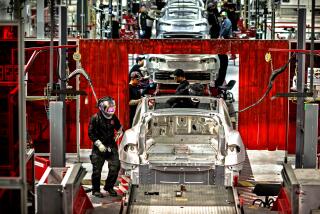Rolling On : GM-Toyota Plant Prospers Amid Auto Industry Slump
- Share via
FREMONT, Calif. — The closing next August of General Motors’ 45-year-old assembly plant in Van Nuys will mark the end of a car-producing era and 2,600 high-paying jobs in motor-minded Southern California.
But in Northern California, the future appears bright for the state’s only other auto factory, where 3,500 workers keep on truckin’--literally now as well as figuratively--despite the stagnant market for vehicles foreign or domestic.
New United Motor Manufacturing Inc.--better known as NUMMI--is owned jointly by GM and Toyota but is managed by Toyota. It has succeeded since its kickoff seven years ago thanks in large part to a Japanese-style “team concept” that reduced absenteeism, boosted productivity and improved quality. Whereas the Van Nuys plant was often afflicted with fractious labor relations, NUMMI has thrived on cooperation.
On Monday, officials from Toyota, Japan’s biggest auto maker, and NUMMI formally dedicated a new, $350-million compact-truck line at the 210-acre plant in Fremont, southeast across the bay from San Francisco. NUMMI expects to produce just 2,500 of the Toyota trucks by year-end, but the plant has the annual capacity for 100,000, or 400 trucks a day, a level that officials plan to reach next summer. Toyota said Monday that it plans to build four-wheel-drive compact pickups at the site starting in February.
Since being launched unofficially in September, the truck line has so far meant the addition of 500 jobs at a time when most auto plants have been reducing production and laying off workers.
At NUMMI, as a result, the mood is anything but gloomy.
“NUMMI’s investment shows their commitment and respect for our workers,” Henry Gonzalez, assistant director with Region 6 of the United Auto Workers, said Monday.
Toyota made its big truck-line investment amid recurring questions about what role GM will have, if any, once the joint venture pact expires in December, 1996. Although GM has remained mum on the subject of late, many industry analysts are betting that the giant auto maker, burdened with overcapacity, will sell its stake and walk away.
Osamu (Sam) Kimura, president of NUMMI, said Monday that GM and Toyota have not had formal discussions about GM’s plans.
The Fremont plant, which GM opened in 1962 to produce Chevrolet cars and GMC trucks, was closed indefinitely in March, 1982, after being saddled with a reputation for high absenteeism, low productivity and poor-quality vehicles.
When GM’s arrangement with Toyota was first agreed upon two years later, the general feeling was that GM hoped to learn the Japanese approach to making cars, including the use of robots and other forms of automation. Toyota wanted to gain experience in the United States with workers and suppliers.
As it turned out, GM’s big prize was learning about how the Japanese developed products and managed people. Many of the techniques GM picked up--such as soliciting worker involvement at every step of production and engineering--have been incorporated at the company’s Saturn plant in Spring Hill, Tenn., said John Hammond, a senior partner with J. D. Power & Associates, a market research firm in Agoura Hills.
Toyota, meanwhile, is slowly increasing its purchases from U.S. suppliers for its newer, bigger Camry plant in Georgetown, Ky.
Sales of both cars produced at NUMMI--the Geo Prizm, marketed by Chevrolet, and the Toyota Corolla--outperformed the overall auto market for this year’s first 10 months.
Car sales slipped 12% through October compared to last year. The NUMMI plant could take on increased importance for Toyota. It has been widely rumored that Toyota plans to launch a full-size truck, a first for Japanese companies in America, with the NUMMI plant being a candidate to win the production, according to Hammond.
Japanese companies have so far steered clear of the full-size pickup market, leaving it to Detroit. And recent speculation about a full-size Toyota pickup has fueled protectionist sentiment in Washington. Should trade quotas on the trucks be imposed, it is assumed that Toyota would decide to produce them in the United States rather than in Japan.
And what do once-skeptical United Auto Workers officials say about the prospect of the plant’s being wholly owned by Toyota?
“I hope” that is what happens, said Charlie Curry, president of Local 2244, which represents NUMMI workers. “It has been a real good success.”







